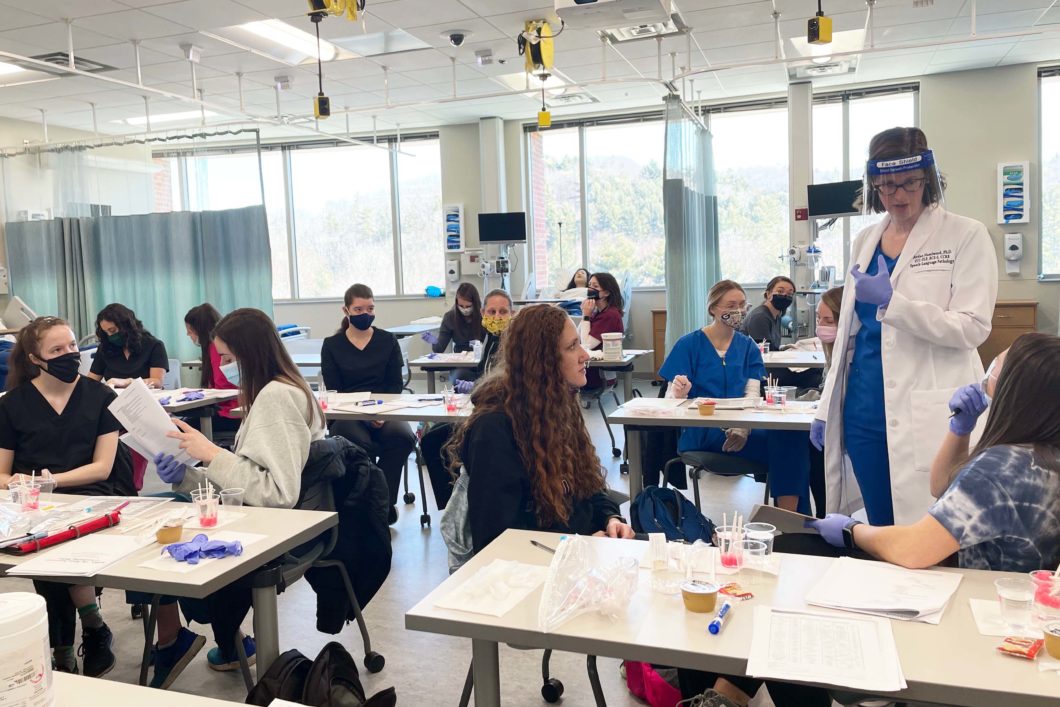Board Certified Specialist in Swallowing and Swallowing Disorders. “I like the sound of that,” I thought. Having learned about specialization in the area of dysphagia management from a guest speaker in our dysphagia class, I realized as a first-year speech-language pathology graduate student this was going to be my career trajectory.
I didn’t always know about the field of speech-language pathology. It wasn’t until college that I just happened to stumble into the CSD major to fill credit hours before I could take chemistry and continue to medical school. But, when I learned that speech-language pathologists work with people with swallowing disorders, my career goals changed. I wanted to know everything I possibly could about being an SLP in the medical setting. I realized being a medical SLP would fulfill the aspirations I had in becoming a physician: knowledge to help others, prestige, financial stability, with the bonus of work/life balance.
Specialization
The human body fascinated me and learning about the brain felt like a privilege. I wanted to understand how to help people, so each new nugget about swallowing and voice disorders excited me and spurred me on to learn more. I knew I wanted to work in the medical setting, but I didn’t know what that looked like.
So, I did all the things:
- Volunteered at a hospital during my university breaks
- Shadowed an SLP who worked in an outpatient voice clinic during my lunch hour between classes
- Became a National NSSLHA member
- Connected with professionals in the ASHA Special Interest Group for Swallowing and Swallowing Disorders
- Volunteered at a head and neck cancer screening event
- Attended sessions on dysphagia at my state’s professional association annual convention
- Borrowed text books from my professors to read more about disordered swallowing
- Explored the ASHA EdFind website to learn more about how to better prepare myself for grad school
As a new clinical fellow, I sought out mentorship from an SLP who was a Board Certified Specialist in Swallowing and Swallowing Disorders (BCS-S). Armed with a five-year plan, I started to complete tasks that would help me achieve my goal of becoming a swallowing specialist. I presented some small research projects, participated in journal clubs, and volunteered my time. I took multiple continuing education courses to develop my clinical skills. I trained. I read. I wrote. And then I added BCS-S behind my name.
But soon after achieving the designation of Specialist I had worked so hard for, I transitioned from collecting specialized knowledge to demonstrating specialized skills. I had started my doctoral program in Health and Rehabilitation Sciences and now needed to defend to other healthcare professionals the skilled interventions provided by SLPs. In my new role as a researcher, I was constantly explaining why SLPs are most poised to provide dysphagia care.
I’ve spent my whole career specializing. I chose clinical sites where I could gain medical clock hours. I negotiated my credit hours to allow for more research time. I choose class project topics that aligned with dysphagia. In short, I aimed for depth of knowledge and neglected to appreciate the breadth of knowledge afforded as part of my training. Though strong academically, I didn’t give my full attention to opportunities that weren’t medically focused.
Generalization
But now, as a university professor, I understand the value of being a comprehensive clinician. As I teach my students, I appreciate that not every SLP-in-training sitting in my class wants to be a medical SLP. However, instead of trying to convince those students that dysphagia should be a clinical interest for them, my goal is to share what I missed: the specialties of speech-language pathology coalescence and support one another. Considering dysphagia rarely occurs in isolation, those who work with patients with swallowing disorders should focus on gaining a comprehensive understanding of the many areas of speech-language pathology.
Here are some examples:
- Developmental milestones direct when children participate in feeding, swallowing, and speech tasks
- Knowing articulatory manner, placement, and voicing helps when providing speech cues to post-stroke patients with dysarthria
- Understanding phonological patterns can improve speech intelligibility for glossectomy patients
- Knowledge of neuropathology supports detecting critical information when conducting chart reviews for those progressive neurogenic disorders
- End of life communication often requires the use of alternative and augmentative communication, including low-tech, high-tech, and electrolaryngeal devices
- Cognitive decline may impact ingestion resulting in other medical needs
- Impairment of the shared respiratory-swallowing tract can lead to deficits in voice and resonance impacting a patient’s identity and ability to work
- Providing communication support to a person with aphasia allows for their increased independence in the rehabilitation process
- Offering insightful education to caregivers of young children who show signs of undiagnosed syndromes
Lastly, SLPs who retain flexibility in their practice may be at an advantage in the ever-changing climate in healthcare due to the COVID-19 pandemic. While specialization is often an early career goal of SLPs in training, generalization is imperative to provide the best comprehensive care for patients.

